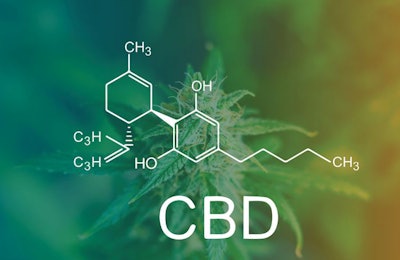
Cannabidiol (CBD)-based products have exploded across the pet and human markets; you’d have to be completely cut off from civilization to not be aware of the phenomenon. This is especially true in the U.S., but what about the rest of the world?
According to reports, Europe – at least the human food market – is also experiencing an influx of CBD products and innovation. The trend is starting to catch on in Asia, even in China, if not for consumption there (at least not legally), then to supply demand in other regions globally.
The lack of legality probably explains why I don’t recall ever seeing CBD products at Pet Fair Asia, a large annual pet trade show in Shanghai, though I will certainly be on the lookout when I’m there again August 21-23. But for that matter, CBD isn’t really legal in the U.S., either, and you can bet there will be dozens, if not hundreds, of products on display at Superzoo the same week – just as there were in 2018 as well as at Global Pet Expo 2019 and last. CBD pet products even made an appearance at Zoomark in May 2019, organizers said.
CBD sales booming, despite lack of legality
In the U.S., sales of CBD products for all species are approaching US$500 million, reported David Lummis, lead pet market analyst for Packaged Facts, in a column in Pet Product News. Citing data reported by the Washington Post, he said those sales are projected to soar to as much as US$22 billion by 2024.
Packaged Facts’ own data shows that sales of CBD products for pets specifically are only a fraction of the total, about U.S.$25 million, but growing quickly. Among U.S. pet owners surveyed by Packaged Facts, 39% of dog owners and 34% of cat owners agree they like the idea of CBD supplements for their pets. Additionally, 29% of dog and cat owners agree they would be interested in purchasing CBD supplements for their pets if they were legal.
Ah, wait, there’s the rub: CBD isn’t truly legal for pet or human products, despite common belief in the U.S. and globally that they are. The misperceptions are based on recent regulations approving the growth and commerce of hemp plants, and products derived from them, with minute levels of THC, the hallucinogenic compound in marijuana. In the U.S., the cutoff is less than 0.3% THC; in Europe, it’s less than 0.2%.
Current state of CBD legalization
The U.S. Food and Drug Administration (FDA) has pointed out that the changes regarding hemp in U.S. law does not affect the agency’s authority to regulate food and drugs in the country. FDA “unequivocally asserts that any product bearing claims to treat, prevent or otherwise affect a disease or condition would be subject to enforcement action as an adulterated drug unless expressly approved by the agency,” wrote David Dzanis, DVM, Ph.D., D.A.C.V.N., CEO of Regulatory Discretion, in a Petfood Insights column earlier this year. “Further, even without claims, it’s unlawful to introduce food (including pet food) containing added CBD (or THC) into interstate commerce, regardless of whether these substances were hemp-derived or not.”
In the European Union (EU), the legality of CBD in pet products is unclear, but they probably are subject to the same types of regulations as human food and beverages with CBD, which fall under the EU’s novel food classification. “For hemp or CBD-infused foods to be approved by the EU, they must apply for pre-market authorization,” wrote Katy Askew on FoodNavigator.com. Regulatory advisors caution that while the novel food classification is not legally binding, EU member states are likely to refuse to grant that authorization.
Booming global CBD demand for humans likely extending to pets
Despite this murky legal status, global sales of industrial hemp are projected to grow from US$4.6 billion currently to US$26.6 billion by 2025, Askew wrote, citing data from Research and Markets. That represents a compound annual growth rate of 34%. Specific to CBD-based products, ones for human consumption have been taking off. Askew quoted a consultant with Persistence Market Research, Pratik Gurnani, who said that over the past 10 years, Europe has launched the most hemp-containing products globally.
Elsewhere in the world, the market for CBD products in Japan is growing nearly 100% a year, according to Hemp Industry Daily. The website described Japan’s CBD market as “regulated,” though it’s not clear if products are truly legal. The legal status seems to depend on which source you consult; not surprisingly, companies making CBD products say they are, but these companies also say they’re legal in the U.S.
As for China, it permits production of industrial hemp (traditionally used mostly for textiles), the sale of hemp seeds and hemp oil and the use of CBD in cosmetics, but it has not approved CBD for use in food and medicines, according to Steven Lee Myers of the New York Times. He said China has cultivated cannabis for thousands of years, including for traditional medicine, despite the lack of legality since 1949 of its consumption because it is considered a drug.
Still, legal questions aren’t stopping investment in Asia: A Chinese firm, backed by a billionaire from the UK, is planning Asia’s first CBD e-commerce platform, called Yooya, wrote Matt Lamers in Marijuana Business Daily. He quoted a hedge fund manager who pegged Asia as the “sleeping hemp giant” and said he expects Asian CBD companies to soon be listed on Asian stock exchanges.
Exporting of hemp and CBD abounds
Interestingly, Yooya plans to source the CBD for its products from North America, Europe and Australia. With the latter country, CBD products are legal for consumption but only with a doctor’s prescription – yet that seemingly doesn’t preclude export of hemp and its derivatives. The same can be said for the U.S., Europe and even China, where two regions “are currently leading a boom in cultivating cannabis to produce cannabidiol, or CBD, the nonintoxicating compound that has become a consumer health and beauty craze in the United States and beyond,” Myers wrote.
One Chinese hemp company he interviewed, Hempsoul, has even bought a CBD extraction plant in Las Vegas and is planning one in Canada.

















